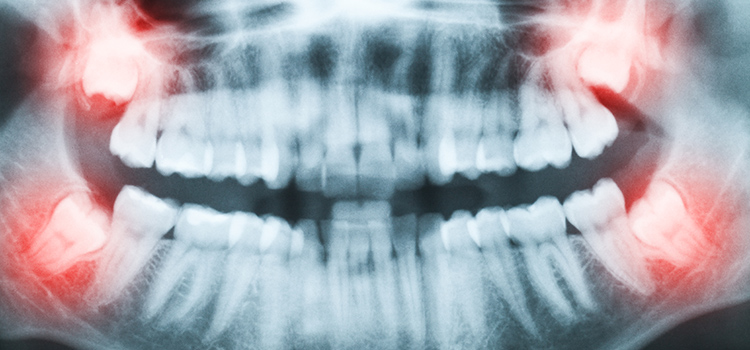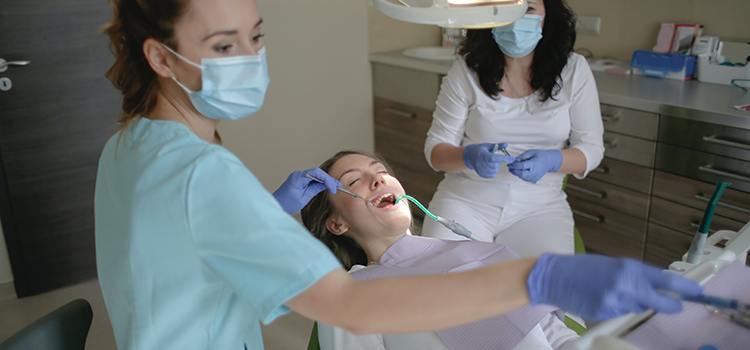Can Wisdom Teeth Removal Cause Teeth Grinding?
21st Aug 2021

Ignoring troubled wisdom teeth isn't smart. If they aren't extracted, these molars can cause pain, tooth decay, gum infection, and tumors. Roughly a quarter of the population will require wisdom teeth extraction. According to Business Insider, 5 million Americans get their wisdom teeth removed each year. While the oral surgery that removes your wisdom teeth can provide relief, some people worry that it can also have unintended consequences: bruxism and TMJ. Can wisdom teeth removal cause teeth grinding?

Can Wisdom Tooth Extraction Cause Bruxism?
It's possible. As Mayo Clinic explains, medical professionals don't yet know what causes bruxism, but they suspect a mixture of physical, psychological, and genetic factors may be to blame. One of the physical factors that can trigger teeth grinding is a missing tooth because this may cause a change in your bite or teeth alignment.
Extracting teeth, especially large molars like wisdom teeth, can certainly change the space in your mouth. However, having your wisdom teeth extracted won't necessarily alter your bite. Avoiding necessary extraction of troubled wisdom teeth is dangerous as it can lead to severe tooth decay and impaction. In most cases, wisdom teeth removal actually relieves pressure.
As the American Dental Association's MouthHealthy indicates, wisdom teeth, also called third molars, can cause problems in a variety of ways:
- Sometimes, there's simply not room for these teeth to emerge when they try to break free of the gums. This typically happens during the late teens or early twenties.
- The wisdom teeth may come in at funny angles. This makes cleaning difficult and sets the stage for trouble with cavities, gingivitis, and other oral health issues.
- The wisdom teeth may become impacted and damage nearby teeth or the bone that supports them.
With their propensity for causing problems, dentists often encourage patients to have their wisdom teeth extracted under anesthetic if there's any sign of pain, infection, dental damage, gum disease, cysts, or tumors. In addition, orthodontists often suggest wisdom teeth extraction as part of their dental care plan to avoid undoing the corrective work of braces.

Can Wisdom Tooth Removal Cause TMJ Disorder?
Thankfully, there's no reason to believe that wisdom tooth removal causes TMJ disorder. The temporomandibular joint is the jaw joint. There are two of them that connect either side of the lower jaw to the skull. When they're functioning smoothly, you can talk, chew, and move your jaw with ease. However, when things go wrong, the results can be painful.
TMJ disorder is characterized by many painful symptoms: sore jaw muscles, facial pain, locking/clicking jaw, and trouble opening/closing the mouth. As Healthline reports, the cause of the disorder is often unclear, but it often seems to involve some type of trauma or a physical problem with the joint. While tooth extraction is not a cause of TMJ, some common suspects in the development of TMJ disorders include the following:
- Injuries to the head, neck, jaw or TMJ.
- Teeth grinding or clenching.
- Arthritis.
- Erosion of the TMJ.
- Structural problems in the jaw or TMJ.
What Should You Do If You Begin Bruxing After An Extraction?
Wisdom teeth extraction isn't exactly comfortable. Colgate says to expect a recovery time of 3 to 4 days or longer if your tooth was impacted. Following your oral surgeon's instructions for proper aftercare can help you avoid additional problems and speed your healing process.
While your doctor may offer specific advice for your situation, the basic recommendations for wisdom teeth removal aftercare are remarkably consistent:
- Take over-the-counter or prescription pain relievers to manage discomfort.
- Use ice packs to control swelling.
- Eat soft foods.
- Rinse with salt water to clean the mouth and prevent infection.
- Rest to promote healing and avoid dislodging the blood clot at the extraction site.
Unfortunately, even if you follow every instruction to the letter, you may still experience jaw pain on one side, sore muscles, and headaches. They may be normal side effects of the surgery, but if you discover these painful symptoms are a result of bruxism, speak with your dentist or oral surgeon right away.

- Most Popular
- Hard Outside, Soft Inside
- 2MM Thick
- Moderate / Heavy

- Most Durable
- Hard Materials
- 1.5MM Thick
- Heavy / Severe

- For Day Time Use
- Thin, Barely Visible
- 1MM Thick
- Light / Moderate

- For Clenching
- Flexible & Soft
- 1.5MM Thick
- Light / Moderate
How Is Bruxism Treated?
There are a number of treatments available for bruxism, according to the Sleep Foundation. They can be used alone or in combination to manage repetitive teeth grinding and jaw clenching:
- Mouthguards: Dental devices are called mouth guard for teeth grinding, night guards, oral appliances, and splints. These devices fit in between the top and bottom teeth to form a protective barrier. There are over-the-counter mouth guards available at your local drug store, but these devices are not recommended for the treatment of bruxism or TMJ. Custom-fit night guards are the dentist recommended treatment for best protection and pain relief.
- Biofeedback: For this treatment, an electronic instrument called bruxism biofeedback device gathers data and signals the patient when a threshold is reached, alerting them so that they can change their behavior.
- Botox: Injections of the botulinum toxin into the large muscles of the jaw can reduce the destructive grinding and clenching without interfering with the ability to talk or chew.
- Relaxation techniques: Stress is often a trigger for bruxing. Relaxing and getting better sleep can be a natural way to reduce bruxism. People have also found success in meditation and yoga.
Related Articles:
Wisdom Teeth Removal and Bruxism
Millions of Americans have their wisdom teeth extracted every year. Swollen, chipmunk cheeks are an almost-certain side effect of the surgery. Bruxism is a possibility, but it is far less common. If you have any concern, about teeth grinding or any other dental issue, reach out to your dentist or oral surgeon promptly. While this surgery is a common one, it remains a serious oral surgery, so open communication with your oral health care team is essential. Be sure to express any questions or concerns that you have clearly, and be certain that you understand the answers that you receive.
References:
- Burke, D. (2019). TMJ (temporomandibular JOINT) DISORDERS. Healthline. https://www.healthline.com/health/tmj-disorders
- Colgate Writing Staff. (n.d.). How long is wisdom Teeth Recovery TIME? Colgate. https://www.colgate.com/en-us/oral-health/wisdom-teeth/what-is-the-recovery-time-after-wisdom-teeth-removal
- Kim, G., & Polan, S. (2021). Why do wisdom teeth suck? Business Insider. https://www.businessinsider.com/why-wisdom-teeth-suck-dentist-dental-health-2018-10
- Mayo Clinic Staff. (2017). Bruxism (teeth grinding). Mayo Clinic. https://www.mayoclinic.org/diseases-conditions/bruxism/symptoms-causes/syc-20356095
- Mouth Healthy Writing Staff. (n.d.). Wisdom teeth. Mouth Healthy. https://www.mouthhealthy.org/en/az-topics/w/wisdom-teeth
- Suni, E. (2020). Tips for coping with bruxism or teeth grinding. Sleep Foundation. https://www.sleepfoundation.org/bruxism/tips

- Most Popular
- Hard Outside, Soft Inside
- 2MM Thick
- Moderate / Heavy

- Most Durable
- Hard Materials
- 1.5MM Thick
- Heavy / Severe

- For Day Time Use
- Thin, Barely Visible
- 1MM Thick
- Light / Moderate

- For Clenching
- Flexible & Soft
- 1.5MM Thick
- Light / Moderate

